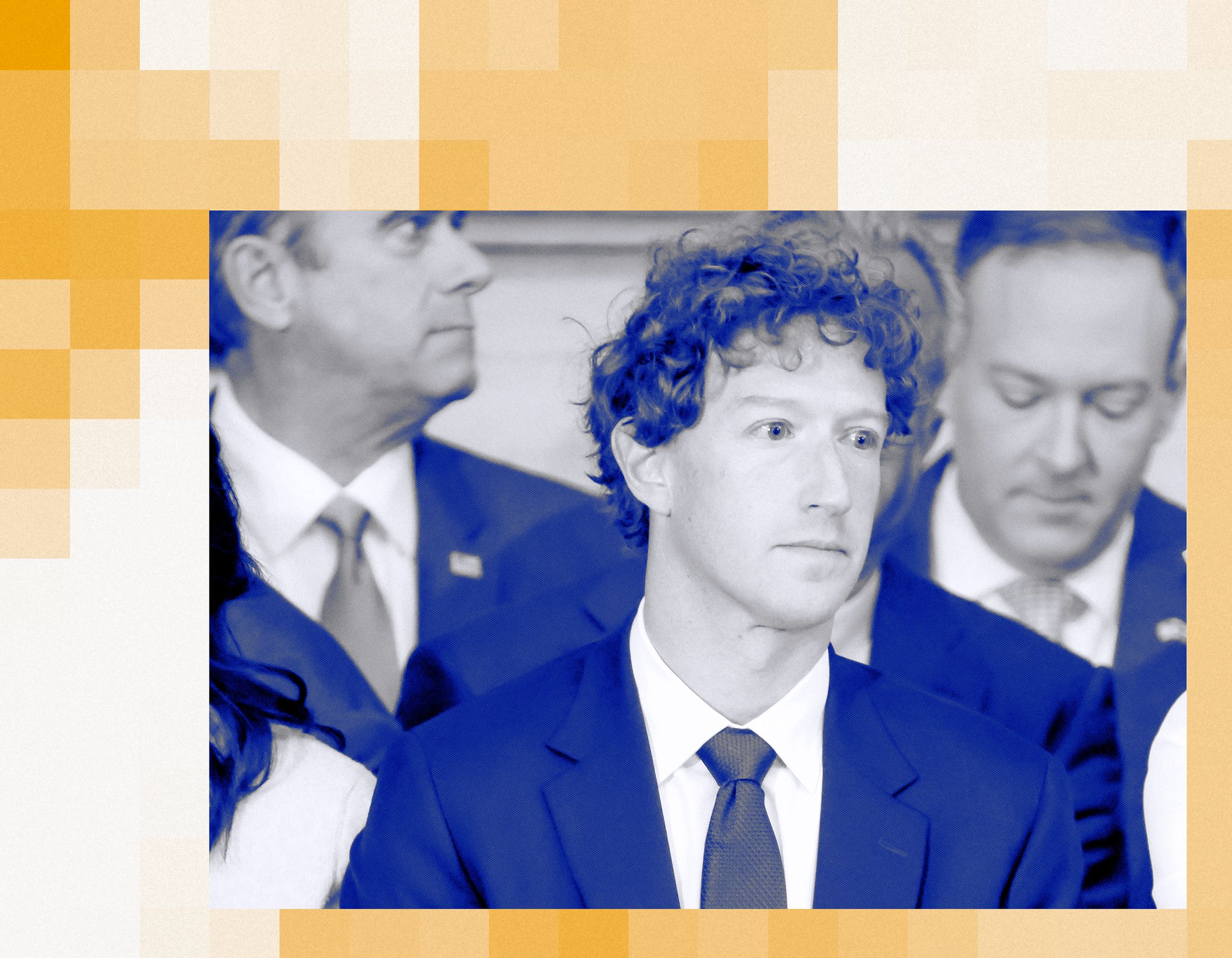This week, Mark Zuckerberg took the stand in an antitrust trial that could result in the breakup of Meta’s social networking empire. It might be years before the nearly 3 billion users of the company’s flagship app Facebook—known internally as the Blue app—learn the fate of the service they still use, despite the constant obituaries. (For the record, two years ago, Tom Alison, who heads the service, issued a statement affirming “Facebook is not dead nor dying.”) But with all the hubbub surrounding the trial, Facebook users might have missed the most significant news about Blue in years. On March 27, 2025, the 21-year-old company quietly announced a new feature on its mobile app: an option that would give users the novel experience of seeing their friends’ content on Facebook. Finally, there was an alternative to a news feed overwhelmed with garbage, gossip, and influencer videos that people don’t necessarily ask for but can’t resist clicking on and then feeling bad about. By locating and selecting the Friends tab, your feed will populate exclusively with posts from people you know in real life and that you have chosen to connect with. You might even call it a social app. Imagine!
The company’s explanation is telling. “Over the years, Facebook evolved to meet changing needs…” read the press release, “but the magic of friends has fallen away.” I marvel at the passive voice. Meta’s valuation is over a trillion. It has connected nearly half of humanity—all because of the power of people wanting to keep up with friends and family. And somehow, the company’s core purpose of connecting friends just … fell away? Did the thousands of engineers, designers, marketers, and managers working on Facebook just wake one day and say, “Hey, has anyone seen the stuff that’s the very reason we are a company?”
No, this didn’t just happen. Consider that, in that 2023 press release about Facebook not being dead, Alison listed the priorities for the app that year, including “artificial intelligence, messaging, creators and monetization.” Not a word about boosting friend content, even though Meta executives knew that people wanted to see just that. It came out in court that for years Zuckerberg has been aware that his users crave hearing more from their friends. A Meta survey in 2020 found that 61 percent of users wanted more friend posts, and 66 percent wanted to see a wider diversity of posts among their friends. A year later, another survey reported that three out of the top four “pain points” on Facebook were due to what the Federal Trade Commission called “reduced investment in friends and family sharing.”
Here’s one explanation for this. Content from influencers, political activists, and faux news organizations is more profitable and keeps people on the service longer. Misinformation from a stranger is worth more to Meta than family updates and travel photos from friends. Those don’t usually go viral. That’s why, when Alison wrote about AI, he didn’t mean using it to find what your friends are saying but to connect you with creators who are posting to boost their own wallets, with the help of Facebook monetization. On the stand, Zuckerberg offered a different explanation for the change: People began sharing on messaging apps instead of social platforms. But could it be that the reason that they stopped sharing on Facebook was that all those toxic posts from strangers made the platform unpleasant?
Zuckerberg was slippery when it came to admitting that he bought Instagram and WhatsApp to eliminate competition—a key issue in the trial. But he was frank in acknowledging that the mission of the company has veered dramatically from the original feel-good crusade to connect humans. It’s now as much an entertainment company as a social network, he says. A chart shared by Meta showed that entertainment had overwhelmed social content. In 2025, Facebook users spent only 17 percent of their time looking at content shared from friends. That’s not because they prefer to read stuff from influencers and anger-boosters—remember, Meta’s own surveys show that users are dying to see stuff from people they know. Yet Zuckerberg matter-of-factly noted that when it comes to friend content, “That part of what we do hasn’t really grown.” Again, the passive voice!
Given the hunger people have to see friend posts, one might expect that the skills of Meta’s talented workforce would be employed to maximize the value of human connections. For many years, it was. In the early 2010s, I was frequently called to Mark Zuckerberg’s conference room, dubbed the Aquarium, to see some interesting project meant to increase the value of the social network. Some of those projects didn’t work out—remember graph search?—but they were honest attempts at fulfilling the company mission. As the decade progressed, the social aspect of Facebook became less of a priority for Zuckerberg, and his passion shifted to virtual reality and artificial intelligence.
Here’s the link to the antitrust case: Meta was able to shift to entertainment because it had locked in billions of customers who originally joined the platform to be in touch with their friends. Without worrying about competition, Meta could then turn the focus toward content from strangers. When Meta copies a feature like Reels from a rival like TikTok, its built-in audience will consume it, even if the originals do it better. The company was able to get 300 million users on Threads not because its Twitter clone was particularly great but because it could easily shift its Instagram audience to the new service. Its biggest innovations on its social apps in recent years aren’t directed at improving the experience for users but at delivering content from strangers that compels you to click or becoming more efficient in serving personalized ads. Meta’s gold standard is not a post about your cousin having a baby but some viral dispatch from an influencer or pundit, whether or not it makes you feel bad about yourself or appeals to some prurient instinct.
In another world I might be able to move my social network to another app that focuses more on preserving “the magic of friends.” But not in this world.
I’m not a lawyer, so I don’t know what the outcome of this trial will be. But I did write a book about Facebook and spent considerable time on how and why the company bought Instagram and WhatsApp. It was clear from my reporting—and internal emails now confirm—that in 2012, Zuckerberg thought Instagram was a competitive threat, and he forced the issue by offering to buy it for $1 billion when the company was worth only half that. I can sympathize with Meta’s argument that it may be unfair to roll back a merger that the government originally approved—but I found out that at the time, one of the five FTC commissioners wanted to pause the deal and take its investigation to the next stage. He was unable to convince the others, and the deal went through.
The WhatsApp founders just plain didn’t want to sell their company. But Zuckerberg’s spyware operation determined that WhatApp’s growth was a threat, and his offers kept getting larger until they reached the absurd amount of $19 billion for a tiny company with miniscule revenue. “Mark Zuckerberg checkmated us,” cofounder Brian Acton told me. “When a guy shows up with a suitcase of money, you have to say yes; you have to make the rational choice.” (Acton came to regret the move. “That is my crime,” he told me.) When a company dared not sell to Zuckerberg he would make good on threats to openly copy its product. While wooing Snap’s Evan Spiegel, Zuckerberg mentioned he was thinking of doing a similar project named Poke. Snap refused the offer and Zuckerberg soon emailed Spiegel a message: “I hope you enjoy Poke.” (Facebook’s clone flopped.)
I’ll leave the remedy for all this to Judge James Boasberg—or Donald Trump, who may pull the plug on the whole operation if he feels like it. (It’s good to be king.) In the interim, I’ve been using the Friends tab, and my feed is much better. The only problem is that so few of my 2,000 friends post on Facebook. They’re seeking magic elsewhere.



